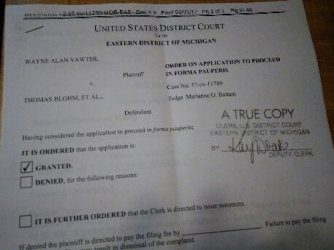Brick Layer
VIP Member
- Thread starter
- #21
STATUTE OF LIMITATIONS (CHILD SUPPORT) 
Statutes of limitations serve important purposes in our criminal justice system. Not only do they protect defendants from having to defend against stale claims, they pressure law enforcement officials to act promptly. The public is served by them in that wrongdoers are brought to justice more quickly. Also, an accused is less likely to be deprived of evidence or witnesses lost through the passage of time.
Although the felony-nonsupport charge is related to an order of support pursuant to the support and parenting time act, it is a distinct criminal action.
MCL 600.5809, this statute as a whole clearly applies only to civil actions, not criminal charges, and sets forth a ten-year period of limitations addressing support orders, a ten year period of limitations for civil claims seeking enforcement and collection of a non-contractual money obligation, the period of limitations is 10 years from the date that the last support payment is due under the support order.
The Michigan legislature did not specify carrying a support arrearage as a means by which an individual could violate MCL 750.165(1). Because a person is subject to conviction and punishment each time the statue is violated, separate violation of the statute cannot constitute a single continuing offense. The legislature did not intend that a violation of MCL 750.165(1) continue until an individual's monetary support obligation is fully discharged.
The CRIME of nonsupport under MCL 750.165(1) is complete at the time that an individual falls to pay the ordered amount at the ordered time, a prosecutor has only six years from that point in which to charge such violations.
MCL 767.24[(5)] is the appropriate statutory limitations period for the criminal offense of not paying child support, "All other indictments shall be found and filed within 6 years after the offense is committed. [Emphasis added.]"
PEOPLE v. MONACO
FindLaw's Court of Appeals of Michigan case and opinions.

Statutes of limitations serve important purposes in our criminal justice system. Not only do they protect defendants from having to defend against stale claims, they pressure law enforcement officials to act promptly. The public is served by them in that wrongdoers are brought to justice more quickly. Also, an accused is less likely to be deprived of evidence or witnesses lost through the passage of time.
Although the felony-nonsupport charge is related to an order of support pursuant to the support and parenting time act, it is a distinct criminal action.
MCL 600.5809, this statute as a whole clearly applies only to civil actions, not criminal charges, and sets forth a ten-year period of limitations addressing support orders, a ten year period of limitations for civil claims seeking enforcement and collection of a non-contractual money obligation, the period of limitations is 10 years from the date that the last support payment is due under the support order.
The Michigan legislature did not specify carrying a support arrearage as a means by which an individual could violate MCL 750.165(1). Because a person is subject to conviction and punishment each time the statue is violated, separate violation of the statute cannot constitute a single continuing offense. The legislature did not intend that a violation of MCL 750.165(1) continue until an individual's monetary support obligation is fully discharged.
The CRIME of nonsupport under MCL 750.165(1) is complete at the time that an individual falls to pay the ordered amount at the ordered time, a prosecutor has only six years from that point in which to charge such violations.
MCL 767.24[(5)] is the appropriate statutory limitations period for the criminal offense of not paying child support, "All other indictments shall be found and filed within 6 years after the offense is committed. [Emphasis added.]"
PEOPLE v. MONACO
FindLaw's Court of Appeals of Michigan case and opinions.







 giving no credit to me
giving no credit to me 









 Title IV-D It's a war on families....
Title IV-D It's a war on families....







